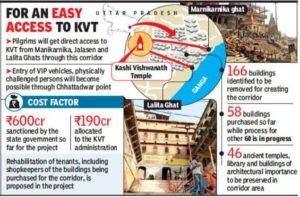Published on: December 13, 2021
KASHI VISHWANATH CORRIDOR
KASHI VISHWANATH CORRIDOR
NEWS
The 400-metre-long Kashi Vishwanath Corridor in Varanasi connecting the ancient temple dedicated to Lord Shiva to the banks of the Ganges was inaugurated by Prime Minister
ABOUT THE PROJECT
- Ahalya Bai Holkar, Holkar queen of Indore, created a series of temples and vistas leading up to the Ganga ghat.
- THE PROJECT
- Encapsulates vision of Ahalya Bai Holkar
- Connects the temple with the ghats of the Ganga, with a paved walkway around 320 metres long and 20 metres wide.
- Facilities for a museum, library, a facilitation centre for pilgrims and a Mumuksha Bhawan (salvation house).
- NEED
- Ease the congestion
- Boost Tourism
KASHI VISHWANATHA TEMPLE
- Famous temple in Varanasi
- Known as the Golden temple dedicated to the Lord Shiva.
- Constructed in the year 1780 by the Maratha monarch, Maharani Ahilyabai Holkar of the Indore.
- On the western bank of the holy river Ganga
- One of the twelve Jyotirlingas, or Jyotirlingams, the holiest of Shiva Temples.
- Main deity is known by the names Shri Vishwanath literally meaning Lord of the Universe.
- Referred to in Hindu scriptures for a very long time as a central part of worship in the Shaiva Philosophy.
- Mentioned in the Puranas including the Kashi Khanda (section) of Skanda Purana.
- Demolished by many Muslim rulers many times, last time It was demolished by Aurangzeb, the sixth Mughal emperor who constructed the Gyanvapi Mosque on its site.
Architecture –
- Constructed in the 18th century in the Nagara style of architecture, it has five shikharas (spires), which start from the bottom and converge on the top.
- The main temple is quadrangle and is surrounded by shrines of other gods.
- There is a small well in the temple called the Jnana Vapi also spelt as GyaanVapi (the wisdom well).
- According to the structure of the temple, there is a Sabha Griha or Congregation Hall leading to the inner GarbhaGriha or Sanctum Sanctorum.
- It is locally known as ‘Monkey temple’ because of the large number of monkeys inhabiting the place.

